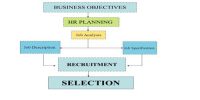Internal Sources for Job Recruitment
It means hiring people from within the organization. There are two important sources of internal recruitment, namely, transfers and promotions, which are discussed below:
(i) Transfers: It involves shifting of an employee from one job to another, one department to another or from one shift to another, without a substantive change in the responsibilities and status of the employee. he purpose of an employee transfer is to enable him to get well-versed with the broad-based view of the organization which is essential for the promotions in future.
(ii) Promotions: Business enterprises generally follow the practice of filling higher jobs by promoting employees from lower jobs. Promotion leads to shifting an employee to a higher position, carrying higher responsibilities, facilities, status and pay. Promotion is a vertical shifting of employees. This practice helps to improve the motivation, loyalty and satisfaction level of employees.
Advantages of Internal Sources
Filling vacancies in higher jobs from within the organisation or through internal transfers has the following advantages:
- Employees are motivated to improve their performance. A promotion at a higher level may lead to a chain of promotion at lower levels in the organization.
- Internal recruitment also simplifies the process of selection and placement. The candidates that are already working in the enterprise can be evaluated more accurately and economically.
- Transfer is a tool of training the employees to prepare them for higher jobs.
- Transfer has the benefit of shifting workforce from the surplus departments to those where there is shortage of staff;
- Filling of jobs internally is cheaper as compared to getting candidates from external sources.
Disadvantages of Internal Sources
Disadvantages of using internal sources of recruitment are as follows:
- When vacancies are filled through internal promotions, the scope for induction of fresh talent is reduced.
- The employees may become lethargic if they are sure of timebound promotions;
- A new enterprise cannot use internal sources of recruitment. No organization can fill all its vacancies from internal sources;
- The spirit of competition among the employees may be hampered; and
- Frequent transfers of employees may often reduce the productivity of the organization.















